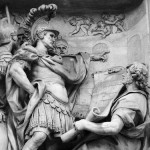We run our website the way we wished the whole internet worked: we provide high quality original content with no ads. We are funded solely by your direct support. Please consider supporting this project.

Jesus’ Different Kind of Nation
God called Abraham to form a unique nation by which “all peoples of the earth will be blessed.” The unique call of the descendants of Abraham was to become a nation of servant-priests whom God would use to reunite the nations of the world under his loving Lordship.
The vision of a reunited humanity is hammered home with increasing clarity and strength throughout the OT. Jeremiah looks forward to the time when “all nations will gather in Jerusalem to honor the name of the Lord.” Zechariah prophesies of a time when the Lord will “be king over the whole earth” so that he will be the only Lord confessed among the nations. And Joel prophesies of a time when God’s Spirit would be poured out “on all people.”
In Isaiah 55 the Lord announces that anyone from any nation who is thirsty or hungry can come and feast at his banquet table for free. He promises everyone who comes to his feast that he will bring them into the “everlasting covenant” that he “promised to David.”
In that same chapter, the Lord makes his global goal clear when he states how his chosen people will “summon nations you know not, and nations you do not know will come running to you” because the Lord has endowed you with splendor. God’s goal was to bless Israel as a means of attracting all nations to himself.
This blessing through this different kind of nation comes as other nations are united under a divinely appointed king. In Psalm 72, we read how the author prayed for a day when “all kings” and “all nations” will bow down” to a king whom God will anoint. When this happens “all nations will be blessed through [God’s anointed king]” and “the whole earth” will “be filled with his glory.”
Through this king all the tribes and nations will be reconciled as they come to know the one true God. Through him God’s dream of a united human community reflecting his triune love will be finally realized.
When the New Testament announces that Jesus is the “Christ,” it is an announcement that he is the anointed one, as Christ means “anointed.” The NT also refers to Jesus as the Lord, not just of the Jews, but of all people. In him, all the prophecies about the nations being reunited will eventually find their fulfillment.
Most of the Jews of Jesus’ day were intensely nationalistic and were expecting a completely pro-Israel Messiah. They though the Messiah would lead Israel to victory over their Roman oppressors and would reestablish Israel as a sovereign nation under God. This is why people tried to force Jesus to act and speak to divisive political issues of the day. But he refused to weigh in on these debates.
Jesus would not let himself be co-opted by any nationalistic agenda—not even on behalf of God’s “chosen nation.” For the kingdom that Jesus came to establish is about fulfilling God’s dream of reuniting all the nations.
Jesus reveals that, where God reigns, national walls will be torn down and national distinctions rendered insignificant. “In Christ,” Paul says, “there is neither Jew nor Gentile.” In Christ “the dividing wall of hostility” has been abolished between groups of people and a “new humanity” has been created. A central aspect of this kingdom is manifesting the beauty of what it looks like for a people to be freed from defining one nation against other nations and to be reunited under the God who is Lord of all nations. Jesus is a different kind of king establishing a different kind of nation.
—Adapted from The Myth of a Christian Religion, pages 78-81
Image by Marcia Erickson
Category: General
Tags: Blessing, Israel, Jesus, Kingdom of God, Nationalism, New Humanity
Topics: Ethical, Cultural and Political Issues
Related Reading

Do All Roads Lead to God?
First, if it’s really true that Jesus is the way to Father and that no one comes to the Father except through him, (Jn 14:6) then it seems that no other religious leader or religious doctrine can bring us to the Father. “The” is a definite article, and it implies singularity. “A dog” could refer…

Sermon: Diaper Power
In this short clip from Greg Boyd’s Sermon Diaper Power, he introduces the theme of the sermon where talks about how the poverty of the manger exemplified the power of God. In this sermon, Greg shows that God really is like the baby swaddled in clothes in the manger. The kind of power that God…

5 Distinctions of God’s Kingdom
Jesus said that his kingdom was “not from this world,” for it contrasts with the kingdom of the world in every possible way. This is not a simple contrast between good and evil. The contrast is rather between two fundamentally different ways of doing life, two fundamentally different mindsets and belief systems, two fundamentally different…

The Kingdom of God (Part 2)
The Church is called to be nothing less than “the body of Christ,” a sort of corporate extension of Jesus’ incarnate body. We are called to replicate who Jesus was by manifesting who Jesus is. And this is how we expand the dome in which God is king—the Kingdom of God. By definition, therefore, the…

Why Didn’t Jesus Denounce Military Service?
A common objection to the claim that Jesus and the authors of the New Testament were opposed to all forms of violence is that neither Jesus nor anyone else speaks out against it. When soldiers asked John the Baptist what they should do in response to his message, for example, he told them not to…

Pretty Little Vampires: Osheta Moore
We’re thrilled today to introduce you to Osheta Moore, blogger extraordinaire over at Shalom in the City. Osheta is in the middle of a wonderful series of blog posts on finding her “tribe”. We love this woman. Listen to a section from her “about me”: I’m an African-American, suburbanite Texan from the Bible Belt living in…
